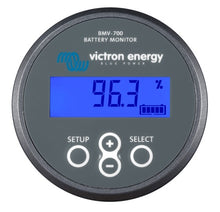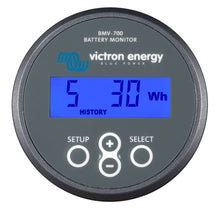PRODUCT CODE : BAM010700000R No Bluetooth
Clearance run out stock
What's In The Kit?
• BMV 700
• BMV square bezel
• 500A/50mV shunt
• 10m UTP cable ( for connection between shunt and monitor)
• Positive supply cable with fuse
The remaining battery capacity depends on the ampere-hours consumed, discharge current, temperature and the age of the battery. Complex software algorithms are needed to take all these variables into account.
Next, to the basic display options, such as voltage, current, and ampere-hours consumed, the BMV-700 series also displays state of charge, time to go, and power consumption in Watts.
Easy To Install
All electrical connections are to the quick connect PCB on the current shunt. The shunt connects to the monitor with a standard RJ12 telephone cable. Included: RJ 12 cable (10 m) and battery cable with fuse (2 m); no other components needed.
Also included is a separate front bezel for a square or round display appearance; a securing ring for the rear mounting and screws for the front mounting.
Easy To Program
A quick install menu and a detailed setup menu with scrolling texts assist the user when going through the various settings. Please consult the manual for details.
Standard Features
• Battery voltage, current, power, ampere-hours consumed and state of charge
• Time to go at the current rate of discharge
• Programmable visual and audible alarm
• Programmable relay, to turn off noncritical loads or to run a generator when needed.
• 500 Amp quick connect shunt and connection kit
• Shunt selection capability up to 10.000 Amps
• VE.Direct communication port
• Stores a wide range of historical events, which can be used to evaluate usage patterns and battery health
• Wide input voltage range: 9,5 – 95 V
• High current measurement resolution: 10 mA (0,01A)
• Low current consumption: 2,9 Ah per month (4 mA) @12V and 2,2 Ah per month (3mA) @ 24V
More About Midpoint Voltage
One bad cell or one bad battery can destroy a large, expensive battery bank. When batteries are connected in series, a timely warning can be generated by measuring the midpoint voltage. Please see the BMV manual, section 5.2, for more information.




